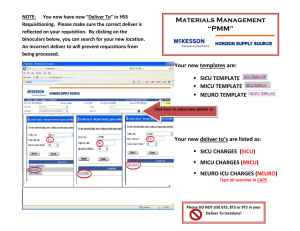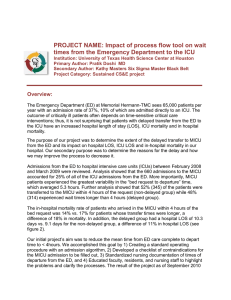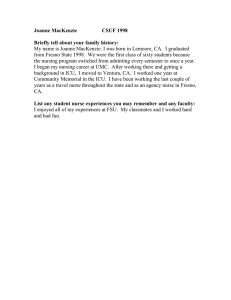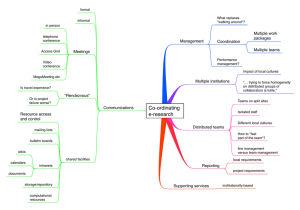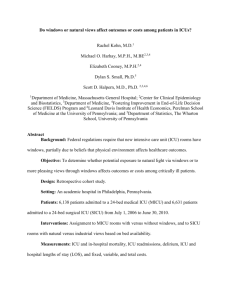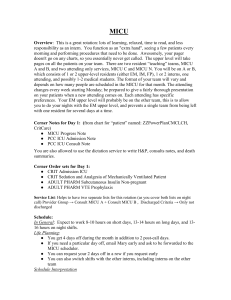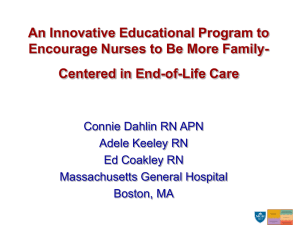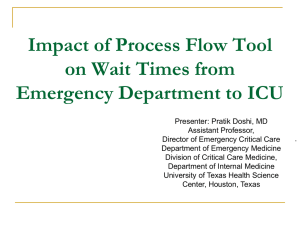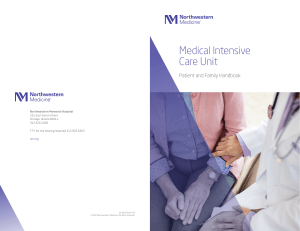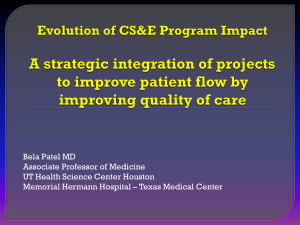Effect of an Early Family Conference on Decreasing Futile Care in Critically Ill Patients in the ICU
advertisement
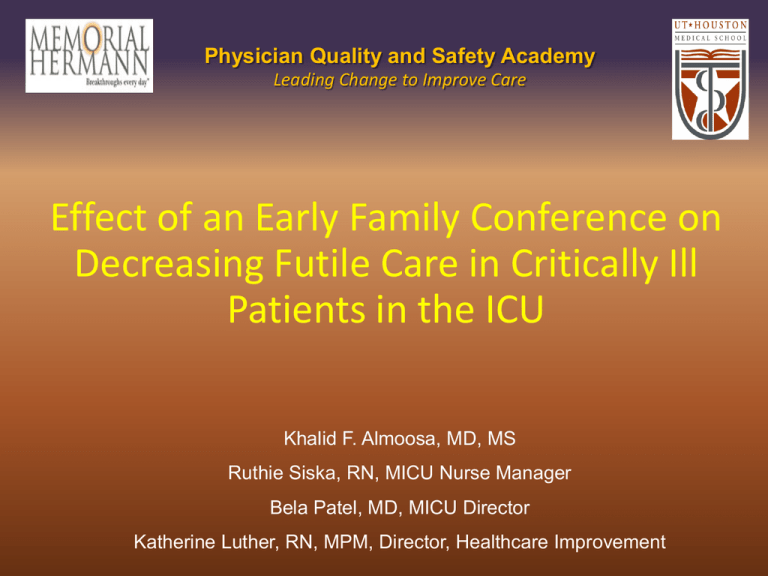
Physician Quality and Safety Academy Leading Change to Improve Care Effect of an Early Family Conference on Decreasing Futile Care in Critically Ill Patients in the ICU Khalid F. Almoosa, MD, MS Ruthie Siska, RN, MICU Nurse Manager Bela Patel, MD, MICU Director Katherine Luther, RN, MPM, Director, Healthcare Improvement Problem: futile care in the ICU 1. 2. 3. 4. 5. 6. What is futile care? Common Many causes Poor prognostication Sensitive topic, significant effect Multidisciplinary approach needed Dartmouth Atlas -End of Life -2006 Jack Wennberg, PhD, Elliott Fisher, PhD Aim Broad aim: reduce futile care through improved decision-making Specific aim: Increase family participation in end-of-life (decisions) via multidisciplinary family conferences Rationale: better communication better decisions Measures of success • % of family participation in conference (& time) • % of families de-escalating care (DNR) • ICU length-of-stay for decedents (days prior to death – futile) Intervention • Multidisciplinary family conferences within 24 hours of patient’s ICU admission • Objectives: 1. 2. 3. 4. Discuss clinical condition Determine family’s perspectives, patient’s wishes Make decisions on care Education Target population MICU Mortality Histogram by LOS Jan 07- Jan 09 70 60 50 40 Focus Area: Length of Stay 2-14 days 30 20 10 0 1 2 3 4 5 6 7 8 9 10 11 12 13 14 15 16 17 18 19 20 21 22 23 24 25 26 27 28 29 30 31 32 33 34 35 36 37 38 39 40 41 42 43 44 45 Length of MICU stay in days Process Map MICU Family Conference Process • • • • • Identify high-risk patients Assemble team Schedule conference Discussion template* Document Introductions Discuss patient status (Dx, Px, Tx) Determine patient’s wishes & establish surrogate. Answer questions Develop plan of care & make decisions Plan on future meetings Patient assessed for high risk of death No Criteria met Yes Family conference scheduled by Nurse Manager/ Charge Nurse Family conference held following defined format Additional follow up conference scheduled as needed No Decision making and plan of care agreed upon Yes Results documented in chart Plan of care implemented Results • Intervention vs. control (historical) Control Intervention Number of patients 264 45 Age (mean) 60.7 63.7 49.4% 49.8% Mortality risk 3.78 3.8 DRG weight 2.35 2.91 66.8% 71.1% % male Met Iezonni criteria* Control Intervention % family conference 27% 60% Time to conference (days) 4.6 1.8 % made DNR 85% 98% Hospital length of stay (days) 10.6 8.3 Results Challenges • • • • No conference room! Teamwork Communication Variety to clinical situations & family dynamics What we accomplished • Family conference = part of standard of care LOS 2.3 days • futile care* Costs: > 5 day group (~80) Avoided 184 days • satisfaction with care saved $847,504 – Improved quality of EOL care • Improved communication • Developed process & format for meetings • Education for trainees Lessons Learned 1. No silver bullet! 2. Don’t know what we don’t know 3. Communication is not easy! 4. Focus…focus…focus… 5. Structure intervention (details) 6. Successes & failures 7. Re-evaluate…feedback…revise 8. Not everyone on board 9. More ideas 10.Benefit to intervention = more than expected! “…For the secret to the care of the patient is in caring for the patient.” - Dr. Francis W. Peabody
